|
|
|
Sort Order |
|
|
|
Items / Page
|
|
|
|
|
|
|
| Srl | Item |
| 1 |
ID:
130198
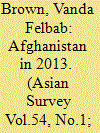

|
|
|
|
|
| Publication |
2014.
|
| Summary/Abstract |
Uncertainties about the 2014 security, political, and economic transitions pervaded Afghanistan in 2013. The failure in 2013 to sign a U.S.-Afghan security agreement permitting the presence of U.S. troops after 2014 deepens those anxieties. As ISAF forces continued to withdraw from Afghanistan, Afghan security forces now have primary responsibility for Afghanistan's security but still face critical challenges and an undefeated Taliban. Peace negotiations have been stalled. Politics were dominated by the upcoming 2014 presidential election that can renew the legitimacy of the existing political system or throw the country into turmoil.
|
|
|
|
|
|
|
|
|
|
|
|
|
|
|
|
| 2 |
ID:
118266
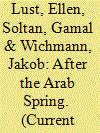

|
|
|
|
|
| Publication |
2012.
|
| Summary/Abstract |
Although Islamism is helping to shape political transitions in the Arab world, this does not foreclose the possibilities of democratization.
|
|
|
|
|
|
|
|
|
|
|
|
|
|
|
|
| 3 |
ID:
121612
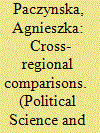

|
|
|
|
|
| Publication |
2013.
|
| Summary/Abstract |
The Arab uprisings, like the fall of the Berlin Wall more than two decades ago, are watershed events that have raised fundamental questions about our understanding of the processes of political change, the emergence and diffusion of contentious collective action, and the role of the international context in facilitating or hindering political change. The uprisings have further strengthened a growing focus within Middle Eastern studies on framing questions about the social, economic, and political dynamics in the region in ways that allow for more robust linkages with comparative theorizing about the dynamics of contentious collective action and the processes of political change. In other words, the Arab uprisings have injected new energy into the comparative study of contentious politics. In addition to new research agendas the uprisings have also provided opportunities for introducing students in survey and theory courses to the region's political dynamics, enriching students' engagement with theoretical concepts and honing their critical thinking and analytical skills while making the Middle East less "exceptional" for the students. Here, I focus on how incorporating of Middle Eastern cases allows instructors to raise questions and engage students in discussions about the emergence and diffusion of contentious collective action.
|
|
|
|
|
|
|
|
|
|
|
|
|
|
|
|
| 4 |
ID:
151763


|
|
|
|
|
| Summary/Abstract |
A basic dilemma for political transitions and peace talks, whether to hold perpetrators of mass atrocities accountable or to negotiate a deal, has once again become the source of intense political controversy. Originally seen as containing a pathbreaking and innovative solution to this problem, a peace deal designed to bring an end to the war between the government of Colombia and the FARC was instrumentalized by former President Uribe to mobilize popular support and was struck down when it was put to the public for a vote. Elsewhere, political realities have impinged on efforts to hold trials, provoking a backlash by powerful individuals determined to spoil the peace rather than sacrifice their personal freedom. But when international criminal tribunals fail to prosecute powerful spoilers, they have been condemned for their hypocrisy or charged with being selective in their pursuit of justice. One measure to address the basic accountability dilemma would be to accept transitional justice compromises that hold a reasonable prospect of delivering peace and that have a strong base of support among those individuals and communities most affected by political violence. Transitional justice strategies should be guided by a do-no-harm principle.
|
|
|
|
|
|
|
|
|
|
|
|
|
|
|
|
| 5 |
ID:
125320
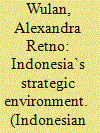

|
|
|
|
|
| Publication |
2013.
|
| Summary/Abstract |
Dynamic of international relations in the third quarter of 2013 showcase two traditional patterns between competition and cooperation. This article depicts several events within the scope of international relations during the period of June-September 2013. Such event evidently illustrate Indonesia`s Strategic environment, in the regional and international level, still corresponds to the patterns of competition which can lead to conflict, and patterns of cooperation that can build peace.
|
|
|
|
|
|
|
|
|
|
|
|
|
|
|
|
| 6 |
ID:
190884


|
|
|
|
|
| Summary/Abstract |
This article investigates how and when regime transitions intensify minority discrimination through an analysis of two types of religious persecution following the Arab uprisings. We argue that weakened institutions and the prevalence of religious outbidding during political transitions make societal-based religious discrimination (SRD) more likely to increase than government-based religious discrimination (GRD). This is because social divisions are often exacerbated and social unrest difficult to contain, while at the same time, policy change can be difficult to enact and enforce. We test these claims through a mixed-methods research design. Employing a synthetic control method, the cross-national, quantitative analysis from 1990 to 2014 confirms that GRD has not changed since the Arab uprisings, while SRD has substantially increased in those countries (i.e. Egypt, Libya, and Tunisia) that also experienced regime change. A case study of Egypt provides more direct evidence of the institutional and outbidding mechanisms. The qualitative analysis draws on ethnographic research conducted in Cairo during 2014, which includes in-depth interviews with Coptic Orthodox Christians. Our findings underscore the twin challenge of protecting and accommodating minority religions during periods of political transition.
|
|
|
|
|
|
|
|
|
|
|
|
|
|
|
|
| 7 |
ID:
133715


|
|
|
|
|
| Publication |
2014.
|
| Summary/Abstract |
This article addresses the highly variable middle-class attitudes regarding political transitions and suggests that social mobility is a key factor conditioning its behavior. Social mobility creates a trade-off for the middle class between autocracy, which yields lower redistribution today, and democracy, which guarantees higher redistribution tomorrow. The way this trade-off is resolved impacts middle-class attitudes toward democratic transitions. Even when the middle class prefers lower redistribution levels under autocracy today, the middle class may prefer democracy today to guarantee higher levels of redistribution in the future, if it feels vulnerable about its future prospects.
|
|
|
|
|
|
|
|
|
|
|
|
|
|
|
|
| 8 |
ID:
130934
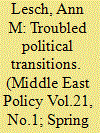

|
|
|
|
|
| Publication |
2014.
|
| Summary/Abstract |
January 14. January 25. February 17. Historic days that marked President Zine al-Abidine Ben Ali's flight from Tunis, the start of the 18-day revolution in Egypt, and the Day of Rage in Libya. President Ben Ali's hands shook as he pleaded for more time to address the public's grievances. Egyptian President Hosni Mubarak played the stern pater familias until he was unceremoniously ushered offstage by senior military officers. Muammar al-Qadhafi threatened to kill the drug-fueled "germs, rats and scumbags"1 who opposed him, but he met a bloody end months later. The overthrow of these powerful autocrats after 23 (Ben Ali), 30 (Mubarak) and 42 (Qadhafi) years of rule cracked sclerotic governing systems and brutal security structures. The uprisings opened up the possibility of futures free from oppression and corruption, futures the people would create themselves. Yet, it is hardly surprising that the transitions remain troubled in all three countries and have failed to meet the expectations of most citizens.
|
|
|
|
|
|
|
|
|
|
|
|
|
|
|
|
| 9 |
ID:
130265
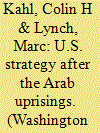

|
|
|
|
|
| Publication |
2013.
|
| Summary/Abstract |
Two years into the wave of upheaval sweeping the Arab world, new regional dynamics have become clearer, as have unresolved tensions in current U.S. policy toward the region. Given the scale and velocity of political turmoil associated with the Arab uprisings, the Obama administration has understandably adopted a largely reactive approach, attempting to adjust U.S. policies to a rapidly changing environment. It has been more successful in those efforts than is commonly recognized, maintaining effective pressure against Iran and al-Qaeda while helping to broker meaningful political transitions in Tunisia, Egypt, Yemen, and Libya. But now there is a sense of drift overtaking American strategy for the region. The time has come for the Obama administration to articulate a more coherent, overarching, positive agenda for the new Middle East.
|
|
|
|
|
|
|
|
|
|
|
|
|
|
|
|
|
|
|
|
|